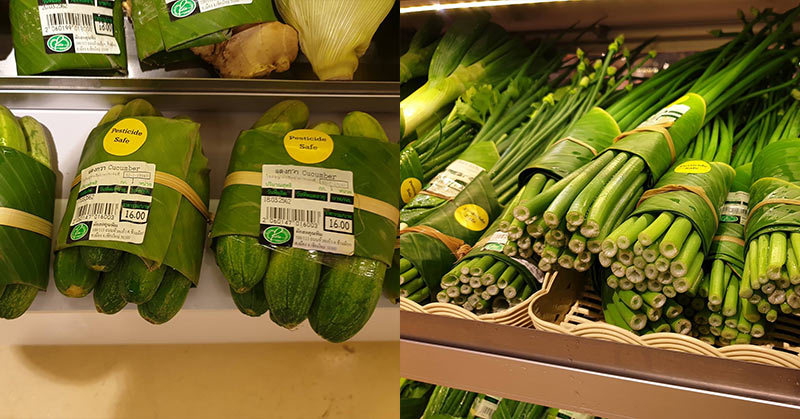It’s always better to find natural solutions to real-world problems.
The Rimping Supermarket in Chiangmai, Thailand has taken drastic steps towards ditching plastic wrapping as a packaging solution. They decided that the amount of plastic being wasted in the world every day is already enough. From a real estate company’s Facebook post, people all over the world were able to see such impressive ingenuity and environmental consciousness [1].
Plastics are manufactured with tons of toxic chemicals. They are non-biodegradable, so it can take anywhere between hundreds to thousands and even millions of years to fully decompose. Even so-called ‘biodegradble plastics’ are not truly biodegradable and have issues of their own [2]. Plastics and their pollutants keep finding their way into the soil, air, and water as the degrading process drags on [3]. While plastics degrade, they dont ‘biodegrade,’ meaning they are not broken down by bacteria, but rather slowly broken down by UV radiation or ocean punishment into smaller and smaller constituents until they are no longer visible. This is one of the reasons we now have major microplastic pollution.
Many plastics are reusable, so they can be recycled. Unfortunately, recycling is a concept that many have yet to embrace.
Going Leafy Green To Save The Planet
Rimping supermarket has begun packing their food items such as cucumbers, asparagus, red bell peppers, potatoes, squash, and leafy green vegetables in thick banana leaves. The food items do much better now on the shelves because they can receive more air.
Despite the fact that they haven’t totally ditched the use of plastic, they’ve done the world major good with the extent they’ve gone. They still use plastic wrappings to hold the labels in place on the banana leaves. The amount still in use is nothing compared to what they would have expended to package countless rows of shelves of food items.
Banana leaves may seem like a weird concept, but they’ve been in use for ages and are actually easy to work with. The leaves are very large, strong and broad, and when the items are wrapped, a flexible strip of bamboo is used to tie the bundle together. It all looks very natural, healthy, and appealing.
Banana leaves are used in a lot of places to wrap food. They can be much cheaper and more available than plastics. In non-tropical regions where bananas don’t grow, they may be more expensive. Banana leaves are so strong that you can actually boil, bake, and steam food in them [4]. They are used extensively in Asia and Africa for cooking purposes. Banana leaves are used the same way you’d use a tin foil or parchment paper, and can also withstand high heat cooking.
Plastics puts the environment at great risk
Using banana leaves for packaging will help to reduce the effect of plastic toxicity on the environment. Only 9% out of the 9 billion tons produced globally since the 1950s has ever been recycled [5]. This percentage is sadly poor.
By the year 2050, there will be 12 billion tons of waste plastic in the earth, some occupying the ground and landfills, and others dwelling in the water bodies. This prediction was made by the United Nations Environment Program. A good percentage of this waste plastic will come from food packages.
Rimping supermarket has contributed its own quota in keeping the environment safe [7]. We need to do our part to reduce the number of plastics we use and to recycle what we do use. When shopping, opt for paper bags that can be recycled or sent to compost, or better yet use a reusable bag made from natural fibers. Some states will even pay you to recycle [8]. We are always learning and changing our ways, try doing your part and reduce plastic waste.
- https://www.sciencedirect.com/science/article/pii/S2351978916301901
- https://www.eartheclipse.com/environment/environmental-effects-plastic-pollution.html
- https://www.thespruceeats.com/cooking-with-banana-leaf-3217239
- https://www.cnbc.com/2017/07/19/the-world-has-made-more-than-9-billion-tons-of-plastic-says-new-study.html
- https://mothership.sg/2019/03/thailand-grocery-shop-rimping-banana-leaves-packaging/
- https://www.msn.com/en-us/lifestyle/did-you-know/what-your-state-will-pay-you-to-recycle/ar-BBPuSXJ

